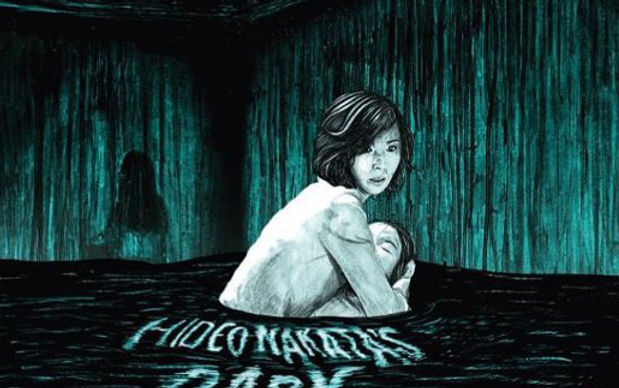ist-pasion.com – Released in 2002 and directed by Hideo Nakata, Dark Water (Honogurai Mizu no soko kara) is a gripping psychological horror film that blends supernatural elements with an emotionally resonant story of motherhood and abandonment. Based on a short story by Koji Suzuki, who also penned Ringu, Dark Water is widely regarded as one of the finest examples of J-horror. Known for its eerie atmosphere, slow-burn tension, and deep emotional core, the film explores the haunting consequences of neglect, loss, and unresolved trauma, all set against the backdrop of a decrepit apartment building with a dark secret.
Plot Overview: A Mother’s Desperate Struggle
Dark Water follows Yoshimi Matsubara, a recently divorced mother fighting for custody of her young daughter, Ikuko. As Yoshimi tries to rebuild her life, she moves with Ikuko into a dilapidated apartment building. From the outset, it is clear that something is wrong with the building—particularly a dark water stain that mysteriously appears on the ceiling of their apartment, growing larger and more ominous as time goes on.
The situation becomes more unsettling as Yoshimi begins to experience strange occurrences, including the frequent appearance of a red children’s bag and ghostly figures. She learns that a young girl named Mitsuko disappeared from the building years earlier, and it becomes apparent that her spirit may be haunting the place. As Yoshimi tries to protect her daughter from the growing supernatural threat, her own psychological state begins to unravel.
Throughout the film, Yoshimi’s mental and emotional struggles are central to the narrative. She is haunted not only by the specter of Mitsuko but also by the fear of losing Ikuko, mirroring her own traumatic childhood experiences with an absent mother. As the supernatural forces close in, Yoshimi is forced to confront both the literal ghost haunting her apartment and the figurative ghosts of her past.
Themes: Abandonment, Motherhood, and Grief
At its core, Dark Water is a story about the bond between a mother and her child, and the profound effects that neglect and abandonment can have on both the living and the dead. Yoshimi’s fear of losing custody of Ikuko is compounded by her memories of her own neglectful mother, and the film draws a parallel between her experience and that of Mitsuko, the ghostly girl who was abandoned by her parents and ultimately lost.
Mitsuko’s restless spirit serves as a haunting reminder of the destructive power of abandonment and the emotional scars it leaves behind. Her presence is not so much malevolent as it is tragic—she is a lost soul, yearning for the care and love she was denied in life. The dark water that seeps through the apartment building is symbolic of the unresolved trauma that floods the characters’ lives, slowly consuming them.
Yoshimi’s struggle to protect Ikuko from the supernatural forces also reflects her own battle with guilt and fear. Her determination to shield her daughter from harm echoes her desire to break the cycle of abandonment, yet her worsening mental state and the mounting supernatural threat raise the question of whether she will succeed or fall victim to the same fate that befell Mitsuko’s mother.
The film also touches on broader themes of societal neglect, as the dilapidated apartment building represents the decay and isolation that can occur in urban environments. The building’s neglect mirrors the emotional neglect experienced by the characters, creating a sense of both physical and psychological deterioration.
Atmosphere and Cinematic Style: A Subtle, Slow-Burn Horror
Hideo Nakata, who previously directed Ringu, brings a similar slow-burn approach to Dark Water. The film is defined by its quiet tension, eerie visuals, and restrained use of horror elements. Rather than relying on jump scares or overt supernatural encounters, Nakata builds a sense of dread through the gradual accumulation of strange, unsettling details—the dark water stain that won’t go away, the mysterious red bag that reappears despite being thrown away, and the oppressive, claustrophobic atmosphere of the apartment building.
The film’s setting is integral to its atmosphere. The rundown, water-damaged apartment building becomes a character in itself, its dark, damp corridors and leaking ceilings serving as a visual representation of the emotional decay at the heart of the story. The incessant presence of water—whether dripping from the ceiling, flooding rooms, or pooling ominously—adds to the feeling of slow, inevitable suffocation.
Nakata’s use of sound is equally important in creating tension. The soundtrack is sparse, often giving way to the sound of dripping water, creaking pipes, or eerie silence. This minimalistic approach amplifies the sense of isolation and dread, making even the smallest disturbances feel unnerving.
The ghosts in Dark Water are not the grotesque, violent specters of many horror films. Instead, they are sad, almost sympathetic figures, trapped in their own loneliness and despair. Mitsuko’s appearances are subtle yet haunting, her presence felt even when she isn’t fully visible. This understated approach to the supernatural aligns with the film’s focus on psychological horror, allowing the emotional weight of the story to take precedence over traditional scare tactics.
Symbolism of Water: Decay, Trauma, and Memory
Water is a central motif throughout Dark Water, symbolizing both the physical decay of the apartment building and the emotional trauma of the characters. The ever-present water leakage in the building is a manifestation of the unresolved grief and guilt that permeates the film. It represents the slow but relentless creep of past traumas into the present, as well as the inescapability of loss and abandonment.
For Yoshimi, the water becomes a literal and symbolic threat. It floods her apartment, disrupts her attempts at stability, and serves as a reminder of her inability to control her circumstances. The spreading water stain on the ceiling is a constant reminder of the unresolved pain she carries, as well as the growing influence of the supernatural forces at work.
At the same time, water is also linked to memory and the past. The ghost of Mitsuko, often associated with water, represents the lingering impact of forgotten or neglected souls—those who have been metaphorically “drowned” by their abandonment. Just as water can seep into the foundations of a building and weaken it over time, so too can the emotional weight of the past erode the foundations of one’s psyche.
Influence and Legacy: A Standout in J-Horror
Dark Water was released at the height of the J-horror wave that took the world by storm in the late 1990s and early 2000s, alongside films like Ringu and Ju-on: The Grudge. While it may not have achieved the same level of international fame as some of its contemporaries, Dark Water has been praised for its emotional depth, psychological complexity, and atmospheric horror.
The film’s emphasis on motherhood and emotional trauma sets it apart from many other horror films, making it a more poignant and introspective experience. Its subtle, slow-building tension and focus on character development have influenced later horror films, both in Japan and internationally. An American remake, Dark Water (2005), was produced but lacked the same emotional resonance and nuanced storytelling of the original.
Conclusion: A Haunting Exploration of Loss and Fear
Dark Water is more than just a ghost story—it is a deeply emotional exploration of motherhood, loss, and the fear of abandonment. Hideo Nakata’s masterful direction and the film’s haunting atmosphere create a slow-burn horror experience that lingers long after the credits roll. By intertwining supernatural horror with the psychological struggles of its characters, Dark Water offers a poignant and chilling reflection on the emotional scars left by neglect and unresolved trauma.
For fans of J-horror and atmospheric psychological thrillers, Dark Water remains a standout film that exemplifies the genre’s ability to evoke both fear and empathy, offering a haunting experience that resonates on multiple levels.




